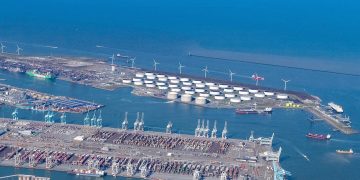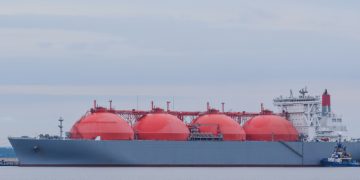“Is maritime right for me?”. Simon Cabaluna Jr., Officer in Charge of a Navigational Watch highlights that the decision should be based on meticulous accumulation of information and research and not only from others’ points of view or by your circumstance. In fact, in the words of Mary Anne Radmacher “listen to the compass of your heart. All you need lies within you.” In similar fashion, Mr. Cabaluna Jr. notes that finding your inner purpose, listening to the compass of your heart, should be of priority.
Mr. Cabaluna Jr. further notes that the pandemic has had a significant impact on the shipping industry. “This situation prohibited the seafarers to chill and relax ashore, and also most of the seafarers have extended contracts on board because of crew change restrictions, with that constant communication to their loved ones is necessary. By providing sufficient free and faster internet access for seafarers will surely help them feel less disconnected from the outside world and improve seafarers’ well-being.”
SAFETY4SEA: What do you love the most out of your career at sea?
Simon Cabaluna Jr.: As a seafarer, an opportunity to explore internationally and help the ecosphere are the roots of my career ineffability – visiting numerous places, trying fancy cuisines, learning the basic language and cultures of different countries, meeting people with diverse nationalities, witnessing the wonders of heavenly bodies while navigating in the vast oceans, and most especially to safely deliver goods worldwide for economic development and sustainability.
S4S: What have you learned over the course of your career at sea?
SC: Years of remarkable experiences at sea, my scope of universal concepts of shipping expanded, nurtured me to be a more well-rounded individual, and opened me up to other galaxies of continual longing for evolutionary curiosity. But what struck my inner ego is to value more the importance of human relationships. Despite cultural differences, educational attainments, achievements, ranks, and distinct mental perspectives, it should never hinder building understanding and camaraderie on board.
Working as a team is necessary to accomplish the duties and responsibilities quickly and effectively. I believed to what John Donne wrote that “No man is an Island” – no one is absolutely self-sufficient; everybody needs the support and comfort of others to thrive and succeed.
In addition, it is acknowledging and embracing a sense of teamwork rather than choosing individualism.
S4S: What is the biggest challenge that you have face on board?
SC: One of the biggest challenges I have faced on board is adaptability to the environment. Sailing on a feeder container ship in the middle of the Pacific Ocean during heavy seas and with incoming extratropical cyclones, my consciousness rotates 360° infinitely and my stomach is experiencing a disastrous situation created by a powerful concurrence of factors. But I always remind myself of the phrase “Susuka pero hindi susuko!” it means “I’m going to throw up, but I will not give up!”. Now, here I am, still alive and kicking!
S4S: What is your piece of advice to fellow crew members onboard?
SC: Being with a multiracial crew on board, I have seen and heard the agony behind their joyous faces.
My advice to all of my fellow seafarers do not lose yourself despite of your mistakes, self-doubts, challenges, doubters, and setbacks along your way, just always believe that you can overcome those catastrophic situations and be the champion of your circumstance.
And you are not alone, I believe in you – in your skills, abilities, and passions.
S4S: What has been the most extraordinary thing that you experienced on board?
SC: My extraordinary experience is that I embarked and disembarked the ship with all and the same crew members on board. We embarked on the ship, accompanied by police officers going to the ship for security purposes and after almost 6 months onboard all of us were repatriated because 50% of the crew members got positive in COVID-19 and one is in a critical situation that needs to be hospitalized. This story may not sound extraordinary, but for me, this experience taught me the importance of security and health in my life. Situations like this reminded me that life is full of uncertainty, therefore I need to live my life every day to the fullest and fulfill my purpose.
As Dr. Myles Munroe said, the greatest tragedy in life is not death, but living a life without knowing the purpose.
S4S: What is the one thing that should change to make life better on board?
SC: We should improve the social interaction on board and provide sufficient free and faster internet access for seafarers – making life on board better. We could improve social interaction on board by organizing activities that promote mental, physical, and social well-being. For example: conducting a barbecue party/get-together, sports games, karaoke challenge, coffee talks, team building, and others. Activities where they could talk, sing, dance, laugh, and express and share their inner “hugots” (life hacks, problems, goals, dissatisfaction, plans, misunderstanding, and some superlative stories).
Furthermore, the pandemic has had a significant impact on the shipping industry. This situation prohibited the seafarers to chill and relax ashore, and also most of the seafarers have extended contracts on board because of crew change restrictions, with that constant communication to their loved ones is necessary. By providing sufficient free and faster internet access for seafarers will surely help them feel less disconnected from the outside world and improve seafarers’ well-being. Lee (2021) published an article about the Seafarers Happiness Index, which showed that internet access is important for today’s seafarers. But this is only possible with the help and cooperation of the shipowners, port authorities, captains, maritime sectors, and seafarers.
S4S: What piece of advice would you give to someone thinking a career at sea?
SC: To those aspiring seafarers, my advice to you is to answer the following questions: What are the advantages and disadvantages of working in the maritime industry? What are the challenges of working in the maritime? What are the necessary personality traits that every seafarer should have? How will you develop those traits and improve yourself continually? Those are simple questions that are useful to evaluate and analyze your decision before choosing a career path of a sailor.
You must be knowledgeable and as much as possible have a comprehensive understanding of the maritime industry and try to connect and visualize it to your future self. Your decision should be based on your meticulous accumulation of information and research and not only from others’ points of view or by your circumstance. After gathering the essential information about the maritime industry, ask yourself; “Is maritime right for me?”. I hope it will be helpful, good luck and wishing you all the best!
The views presented hereabove are only those of the author and do not necessarily those of SAFETY4SEA and are for information sharing and discussion purposes only.




























































Remarkable insights, Simon!
Thanks, Y!
Proud batchmate here!
Thanks, Frans!